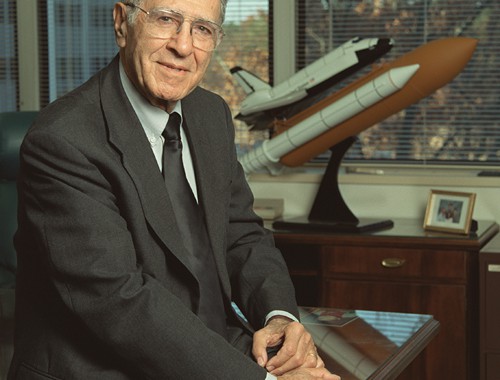
Many people at Marshall say you are the best mentor they’ve known. What does mentoring mean to you?
| Alex McCool began his career in 1954 at Redstone Arsenal in Huntsville, Alabama, working on the design of the Redstone and Jupiter rockets. In 1960, he joined NASA to continue working with Dr.Wernher von Braun, Marshall Space Flight Center’s first director and a leader in America’s race to space.As a charter member at Marshall, McCool was instrumental in the design of the propulsion systems for the Saturn launch vehicles that propelled Apollo to the Moon and directed project engineering for Skylab, the first space science laboratory. Alex McCool’s 48-year career includes exceptional contributions to the vehicles that launched America into orbit and carried human beings to the moon. Presently, he is the manager of the Space Shuttle Projects Office at Marshall. Among his many honors he recently received the National Space Club’s 2002 Astronautics Engineer Award. The award recognizes those who have made outstanding contributions in engineering management to the national space program. |
I love being around people, particularly young people. I love helping them, mentoring them, and I love to see them do a good job no matter what it is. You give them a job and they will stub their toe, and that’s all right. I want them to learn, but I try to guide them and help them to learn, grow and develop. It makes my day when they do a good job and get recognition, or by just seeing how they have developed over the years.
If you had to pass on one thing to a young project manager, someone who thinks it would be great to be as active and productive for as long as you have, what would that be?
Live a balanced life.What I mean by balanced life is the three “F’s”: Faith, Family, and Friends. What I’ve found is that you have to do it by action; you can’t just say it, you’ve got to live that way.
Do you recall a time in your career when you had to rely on the three F’s to help you through some difficulty?
Oh, absolutely. No question. I was there for Challenger. I saw Challenger. I was not involved in that launch. I had gone down the day before. The Launch Director, Gene Thomas, was a very good friend. His spiritual life got him through that, and it taught me something too. He and I got very close.
what it is.
What did you learn from that?
Well, you’ll have to allow me to digress here for a moment. Around that same time, my wife had a malignant ovarian tumor, you see, and she had to take chemotherapy. The whole thing just really wiped me out for a period. My spiritual life, my faith, helped me through that and I think knowing Gene Thomas and all he was going through, we got to sharing between us, and we got real close spiritually. Finally, Gene prior to the launch of Challenger knew each of the crew and had spent time with them before their flight. He has been one of my heroes and inspired me.
Weren’t you involved in a post-Challenger project to investigate the accident?
Yes, that’s right. I worked closely with the Navy on recovery at KSC. We were looking for our hardware — and they wanted somebody who was familiar with propulsion. I took a group down there with me, and I guess I was the leader of that group. I remember getting the phone call at 7 o’clock on a Sunday morning. “Hey, we believe we found something.” So I called Kennedy [Space Center] and said, “Can you get us out to the ship?” The Navy had a big salvage ship, probably a hundred miles away. So we got out there on a Coast Guard Cutter and we were told it was going to be rough seas, and sure enough it was. Let me tell you I was scared.They put life jackets and slickers on us. So we get over there to this big ship, and sure enough there was a piece of it where it had burned through.We got back to land about 1:30 in the morning at Port Canaveral, and I said, “Well, we are going to have to get out there the first thing in the morning, six or seven o’clock, because the NASA brass will want to see what we found out.” Sure enough they were waiting on us, all the NASA leadership, and that was just the beginning. We had taken photographs and measurements and were able to describe it.They directed us to radio the salvage ship and had them bring the piece to the port.
Was there anything special you had to do to prepare the team emotionally for a project like that?
Well, the big thing was, we had the attitude that this was a job we had to go do. In the early days after the accident, we didn’t know what had caused the explosion, so ours was a mission to try and understand what happened.That gave us a sense of purpose and was a powerful motivator.
How do you approach trying to solve a problem like finding out what caused a catastrophic failure?
It’s a little bit like detective work. You ask, “What are the things that could have caused this?” You put them all down and you try to work them off. Could it be this? Could it be that? Could it be just a lack of this? Did something go wrong with the equipment? So it is a lot of detective work. To me, it is fascinating.We use what is called a “fault tree,” which is a disciplined methodical approach.
Is there a difference in your preparations to try to figure out what went wrong with something as opposed to trying to build something?
It’s still primarily about getting the right team of people, getting the right skills to help you. I’m just the leader and I’ve got to have them to help me because I can’t do it alone. I’m just the coach, in other words, and I want to pick the good people with certain talents to compliment my background and make it work in the different areas. So you try to organize around people and get out of their way, because they know it better than you do.
What is your role after you’ve brought the team together?
It’s a matter of organizing and providing the leadership and the vision. Where are we going? First, though, it starts with people — finding the right people, putting the right team together and making sure they are motivated.
How do you continue to keep people motivated through the life of the project?
What’s important is to recognize when somebody does a good job. And don’t wait, do it first thing. Reinforcement, that helps team building — and that’s leadership when you do that — whether it’s a pat on the back, whether it’s a note, whether it’s handing them a check or just saying the words, “Thank you.” It’s very important to show that kind of positive reinforcement, because they build on that. Young people need that recognition, it’s very important. And I think if you don’t get anything else out of this discussion, make sure you print this: “Leaders need to be sensitive to recognition of their key people who have really performed.” It’s very important. So that’s positive reinforcement. There can be the other thing called negative reinforcement, and you have to be very careful how you deal with that.
What do you mean by “careful”?
Well, I mean you just need to be careful. You may have to do it because somebody messed up, but it is how you do it, how you approach it. Let me give you an example. We have a guy in the factory, and he says, “I know I messed up.” He confesses that he made a mistake, recognizing he may be fired. You would like to make a case that this is not acceptable, but do you fire him? That sends a very dangerous message to the other guys. Integrity is not valued. See what I’m saying? You don’t want them to mess up, but you also want them to come forward. You want them to be honest. I learned that one by the way from von Braun. Now he was very charismatic. An interesting person, too, one of the most interesting persons I’ve known. The guy had a balanced life, and I come back to what I said originally about balance. He would go scuba diving, big game hunting up in Canada and he did a lot of things with his family. But the thing I was saying is, we had this guy who didn’t hook up some wires like he should have, and he confessed to that. I remember how von Braun bought him a bottle of booze. He did that to reward him for being honest — and he helped him to drink it too! Think about it, do you really want to punish the person for doing the right thing by coming forward. Why dampen his spirit? That makes him less motivated to succeed. We are talking about integrity and honesty.
I’m curious about what motivates you. You’re 78 now. You could have retired many years ago. You spoke about what a downer that period was when your wife had cancer and then the Challenger accident. Did you ever consider retirement then, or have you since?
When I was around 55, one evening I got home and I guess I was feeling glum. I said, “I wonder if it is time for me to hang it up?” I’m talking to my wife, and I never forgot this, I said, “What do you think?” She said, “Let me ask you this question? Are you happy in your job?” Boy, she didn’t crack a smile or say anything, and so I looked her in the eye and I said, “Yeah.” And she said, “You need to stay right where you are, then.”
Would she say the same thing today?
Oh yes, absolutely! Until this day she says, “You keep working.” Because she knows I love it. Life should be fun; we should have our work as a passion and try to make a difference in everything we do.
Search by lesson to find more on:
- Mentoring







